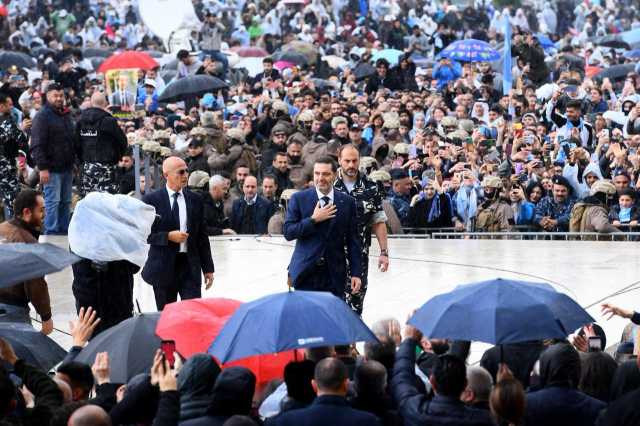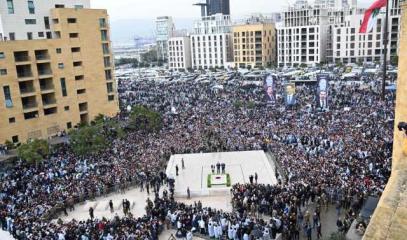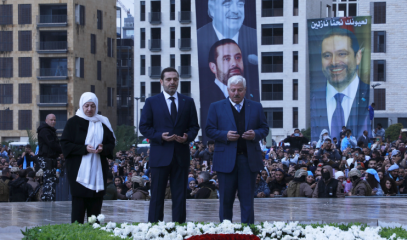Saad Hariri returns as Gaza casts shadow over Lebanon
After two years of voluntary exile yesterday, the former premier attended celebrations marking the 19th anniversary of the assassination of his father Rafic. Analysts and observers point to his re-election bid in 2026, but the regional scenario presents new tensions and challenges. A rapprochement with the Saudis and relations with the Christian bloc the decisive factors.
Beirut (AsiaNews) - As part of the celebrations marking the 19th anniversary of the assassination of Rafic Hariri, still unpunished, appeals are multiplying to his son Saad, his political heir, for a return to active life in the country at a time of deep crisis.
The Sunnite leader and former prime minister, a symbol of moderation and openness with deep ties to Riyadh, seems to be inclined to accept the invitations: he has in fact begun to mobilise the square in view of the 2026 elections and took advantage of yesterday to launch his own campaign in anticipation of the vote.
Having returned to Lebanon for this commemoration two years after his voluntary exile in the United Arab Emirates (UAE) and the freezing of the activities of his faction, the Movement of the Future, will Saad Hariri again seek his fortune?
Undoubtedly he leaves with some not inconsiderable advantages. Starting with his capital in terms of popularity, which he owes first and foremost to his father, which seems to have remained intact.
After all, a large part of the Sunni world is still tied to the myth of Rafic Hariri, while within this line-up, the 2022 elections failed to impose a replacement Sunni leader of equal authority.
The community is fragmented and has to suffer in silence the hegemony of Hezbollah, in the name of national unity and civil peace, with its gaze no longer oriented towards Damascus but still searching for an identity.
In the pouring rain, Saad Hariri, flanked by his aunt, former parliamentarian Bahia Hariri, and her husband, recited the 'Fatiha' at his father's grave, and then took a short walk among the people.
Around the mosque, a large crowd offered Rafic's political heir a festive moment. In spite of his renewed popularity, gloomy clouds seemed to be gathering over the face, and future, of the Sunni leader.
'Everything in its own time, I will not abandon you, defend the homeland and stand up for your rights, showing them that you are a force to be reckoned with, and that the country cannot function without you,' he told the microphones in his brief address to the crowd, before getting back into his car.
Shortly afterwards, at the entrance to his home in central Beirut, he repeated these vague slogans. Saad Hariri then insisted that his father had been killed because he was a 'symbol of moderation and openness', the only public allusion to the unpunished crime attributed in 2020 by the International Tribunal for Lebanon to 'alleged members' of Hezbollah. However, in private, his associates testify that this is a wound that still remains open.
"Everything in its time, my return is not the priority right now... " was Saad Hariri's invariable response to all those who pressed him with questions about his desire to return to the political scene.
A statement that politicians and analysts have rephrased, interpreting it, in this way: 'I am just waiting for the right time'. A time that the Lebanese political world has set in the electoral appointment scheduled for spring 2026, when the mandate of the current Chamber of Deputies that had appointed him prime minister expires.
This appointment was made impossible by the inadmissible conditions set by the faction referring to former President of the Republic Michel Aoun [whose seat remains vacant more than a year after the end of his mandate] and which forced him to remit the mandate to form the government.
However, apart from sectarianism and communal affiliation that continue to characterise and dominate political life in the Cedar Country, externally the political landscape in the region has changed considerably since Hariri's decision to temporarily withdraw from active politics.
The former premier now has to deal with the Hamas-Israel war and the reconfiguration of alliances in the Middle East. A conflict that in recent hours has escalated further in the north, with Hezbollah launching missiles towards Israel that caused the death of a female soldier.
The response of the Israeli Army was immediate with the launch of a series of heavy bombardments that killed at least 13 Lebanese, mostly civilians including women and children.
Hariri must also take into account the rapprochement between Saudi Arabia and Iran under the auspices of China, and a strange modus vivendi between the United States and the Islamic Republic that has taken shape in recent weeks with simultaneous calls by Washington and Tehran for 'appeasement' in the region.
He must then consider the freezing of the normalisation path between Saudi Arabia and Israel, a process that Riyadh is now subordinating to a solution of the Palestinian issue. Not to mention that this condition coincides with a series of crucial deadlines, starting with the US presidential elections in November.
Moreover, the former premier - whatever the nature of his dispute with Saudi Crown Prince Mohammad Bin Salman (Mbs) - knows he cannot govern without the support of Riyadh, which, together with Egypt, embodies the religious, human and economic depth of the Sunni world.
It is therefore the signs of a rapprochement between Hariri and the Saudis - as well as with the Christian blocs - that observers are now watching to be sure of his return to politics.









.png)










